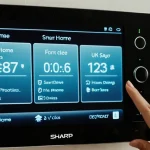Key Benefits of Smart Home Technology for UK Households
Smart home benefits provide UK households with tangible improvements in daily living. One of the main smart technology advantages is enhanced energy efficiency, achieved by automating heating, lighting, and appliance use. This not only reduces waste but aligns with the UK’s push for sustainability.
Security is another significant smart home benefit. With options like smart alarms, surveillance cameras, and video doorbells tailored for UK property safety, homeowners enjoy continuous monitoring and instant threat alerts. These features increase deterrence and enable rapid emergency responses, ensuring peace of mind.
Also to read : What are effective methods for soundproofing a UK home?
Cost savings represent a vital smart technology advantage. Automation and remote management allow precise control over energy consumption, helping to lower utility bills. Moreover, intelligent systems can adapt to usage patterns, maximizing financial benefits for UK households. These innovations also have the potential to increase UK property value, making smart homes a sound long-term investment.
Overall, these key benefits demonstrate how smart home technology improves security, energy management, and financial outcomes for UK households.
In the same genre : What are the best smart home technologies for UK homes?
Energy Efficiency and Environmental Impact
Smart home benefits significantly boost energy efficiency in UK households by integrating advanced technologies like smart thermostats and automated lighting systems. These devices respond accurately to household occupancy and temperature needs, ensuring minimal energy waste. Smart thermostats, for example, adjust heating based on real-time conditions, saving energy without sacrificing comfort.
How do smart systems align with UK energy tariffs? They connect directly to smart meters, enabling users to optimise energy use during off-peak hours when tariffs are lower. This integration helps households reduce bills while supporting the grid’s balance. Automated appliances can also switch off or enter low-power modes when not needed, contributing further to efficiency gains.
Beyond saving money, these smart technology advantages support UK climate targets by lowering overall carbon footprints. Automated lighting and heating reduce unnecessary consumption, aligning with national sustainability goals. UK households adopting these systems contribute positively to environmental impact without complex manual adjustments.
In essence, the synergy between smart home automation, UK energy tariffs, and smart meters offers a powerful tool for cutting energy waste. This practical combination improves daily convenience and supports broader ecological commitments in a meaningful way.
Security and Peace of Mind
Smart home benefits include advanced security solutions designed specifically for UK households. Smart alarms offer continuous 24/7 monitoring, instantly alerting homeowners to unusual activities. These systems analyse sensor data to differentiate between genuine threats and false alarms, reducing unnecessary stress.
Surveillance options integrate seamlessly with smart locks and video doorbells adapted to UK property safety needs. Video doorbells enable residents to see and communicate with visitors remotely, enhancing security at entry points. Smart locks provide keyless entry controlled via smartphones, allowing users to grant or revoke access instantly.
How do these features improve home security? Immediate alerts and real-time monitoring deter potential intruders by increasing their risk of detection. Remote access gives homeowners control even when away, boosting responsiveness to incidents. For example, a UK terraced home equipped with smart surveillance reported quicker police response due to instant alarm notifications.
By combining 24/7 surveillance, smart alarms, and UK-focused security devices, smart home benefits create a safer environment and reinforce peace of mind for UK households. This comprehensive protection approach suits varied UK housing types, from flats to detached houses.
Cost Savings and Financial Benefits
Smart home benefits offer significant cost savings for UK households through precise consumption monitoring and automation. By controlling heating, lighting, and appliances remotely, users reduce unnecessary energy use, directly lowering utility bills. Automation learns daily routines, ensuring devices only run when needed, avoiding wastage.
How do smart systems impact UK home finances? They help households optimise energy consumption with timely adjustments, leading to measurable reductions in monthly bills. Over time, this sustained saving contributes to recovering the initial smart home investment.
Beyond direct savings, smart technology advantages also influence UK property value. Homes equipped with smart features often attract higher offers, reflecting rising buyer interest in energy efficiency and security. This trend makes smart home investment not just a living convenience but a financially smart decision.
Additionally, some UK insurance providers recognise these technologies by offering discounts, rewarding increased security and reduced risk. This potential incentive enhances the overall financial appeal of smart home technology.
In summary, cost savings from automation and remote management, combined with property value benefits and possible insurance discounts, make smart home systems economically attractive for UK households.
Convenience and Lifestyle Improvements
Smart home benefits offer notable convenience and lifestyle improvements tailored to UK households. Automation enables routines to be scheduled around daily patterns and typical UK weather conditions, ensuring homes are cosy when needed without manual adjustments. For instance, lights and heating can activate just before residents wake up on chilly mornings, enhancing comfort effortlessly.
How does smart automation boost quality of life for UK users? By hands-free control through voice assistants compatible with UK devices, all family members gain easy access to manage appliances, entertainment, and security systems. This feature simplifies interaction, particularly for those less comfortable with traditional remote controls or apps.
Another advantage lies in streamlined daily task management. Automated reminders or scheduled cleaning modes help keep UK homes running smoothly, saving time and reducing stress. For example, robotic vacuum cleaners can operate during work hours, returning before evening without disturbing household activities.
In summary, smart home convenience in UK residences emerges through adaptable automation, intuitive interfaces, and practical scheduling. These smart technology advantages not only improve efficiency but also elevate everyday living with minimal effort, making smart homes a valuable asset for modern UK households.
UK-Specific Smart Home Integration
Smart home benefits in UK households depend heavily on UK-specific tech designed to suit local standards and living conditions. Devices compatible with UK electrical systems ensure safe and efficient integration, avoiding common pitfalls of generic products. For example, smart plugs and bulbs must fit UK sockets and voltage requirements precisely.
How do smart systems address UK housing challenges? Many solutions adapt to typical UK residences, including terraced homes and flats, where space and privacy considerations differ from detached houses. Smart surveillance and alarms are tailored to these environments, optimising coverage and reducing noise disturbances.
Adapting to UK weather is another key smart technology advantage. Devices account for frequent rain and variable temperatures, ensuring durability and responsiveness. For instance, smart heating systems adjust not only to indoor conditions but also to external UK climate patterns, maintaining comfort while minimising energy use.
In summary, local devices and tailored integration make smart home benefits more accessible and effective for UK households. This targeted approach enhances usability and long-term reliability, supporting widespread adoption across diverse UK housing types and infrastructure needs.
Real-World Examples and Case Studies
Real-world examples highlight the tangible smart home benefits experienced by UK households embracing smart technology advantages. One UK case study revealed a terraced home reducing energy bills by 20% after installing a smart thermostat combined with automated lighting. This success underscores how precision heating control and scheduled appliance use translate into substantial savings.
What practical improvements do UK homeowners report? Many note enhanced home security, citing smart alarms and video doorbells that provide constant monitoring and instant alerts, which increased their sense of safety. For instance, a flat occupant shared how integration of smart locks and surveillance cameras deterred burglary attempts and expedited police response.
Feedback also reflects lifestyle enhancements, with users praising automation for managing daily routines effortlessly despite busy schedules. A retired couple highlighted robotic vacuum cleaners working quietly during the day and heating systems pre-warming rooms before mornings.
These UK case studies demonstrate that smart home benefits extend beyond theory, delivering measurable results in energy efficiency, security, and convenience. The growing number of satisfied UK homeowners confirms that adopting smart technology advantages is both practical and rewarding.

